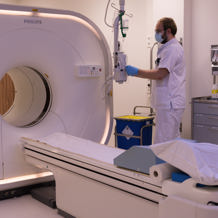Penile cancer
Penile cancer is an umbrella term for all cancer types that develop in the penis. Most tumors develop in the foreskin or penis glans. Penile cancer is very rare. About 150 men in the Netherlands are diagnosed with penile cancer every year. Penile cancer usually occurs in men who are older than 60, although young men can also develop penile cancer (or its precursor).
Have you been diagnosed with penile cancer, or is the tumor type suspected? Please ask your practicing physician to refer you to the Netherlands Cancer Institute.
Click here to read more about our urology department and its specialists.
Rapid diagnostics
It will take approximately 12 days before you can start rapid diagnostics. You will have an appointment with your urologist and nurse practitioner on the same day. If necessary you will also have an ultrasound of the groin, biopsy, and a consult with your anesthesiologist.
Center of expertise
Penile cancer is a rare cancer type. Many physicians won’t encounter many patients with penile cancer. This is why the care for patients with penile cancer is centralized at the Netherlands Cancer Institute, the only recognized penile cancer center of expertise in the country. This enables us to share our knowledge with the rest of Europe while allowing us to stay up to date on the latest developments.
Why the NKI?
- The NKI is the only penile cancer center of expertise in the Netherlands.
- We fully integrate research and care which allows us to treat all our patients following the latest developments and treatment options. We can give you advice which is fully based on your personal situation.
- We offer all possible treatment options at the Netherlands Cancer Institute.
- The quality of care we deliver is among the highest, worldwide, according to our survival rates.
- We offer care support such as lymphedema support, psychological guidance, reconstructive surgery, and rehabilitation.
-
968
patients with penile cancer -
192
new patients
Treatment team
All our specialists are experts at the treatment of penile cancer. They come together in the penile cancer focus group and join together every week for a multidisciplinary team meeting where they will discuss your personal situation, test results, and medical history in order to find the treatment option that best fits you. Your practicing physician will discuss your options with you. At the Netherlands Cancer Institute, we value your thoughts and input on your treatment.
Causes and symptoms penile cancer
Risk factors
Penile cancer most commonly occurs in men with a tight foreskin. If your foreskin is too tight, you will have more trouble cleaning the glans, which increases your risk in developing a chronic or returning infection of the foreskin or glans. This is one of the factors that can increase your risk of developing penile cancer.
The main risk factors are:
- The human papillomavirus (HPV)
- Tight foreskin
- Bad hygiene / long-term infection of the glans
- Smoking
- The skin condition lichen sclerosus
Humaan papillomavirus (HPV)
There are approximately 100 different types of HPV. Most are harmless, but some increase the risk of developing cancer. HPV is primarily known in connection to cervical cancer, but can also play a role in the development of anal cancer, vulva cancer, and penile cancer (usually HPV 16 or 18). The virus can also play a role in the development of oral cancer. Some benign abnormalities like genital warts are also caused by HPV (usually type 6 or 11).
HPV and penile cancer
At least 80% of all people who are sexually active will eventually contract HPV. In most cases, the immune system will clear the virus from the body within two years, but in the rare cases that this doesn’t happen, HPV can cause several types of cancer, usually after many years. Penile cancer is one of those cancer types. One-third of people (30 to 50%) with penile cancer developed a tumor as a result of HPV. Not all people diagnosed with penile cancer also have HPV. Your doctor can tell you whether it’s a good idea for you and your partner to get tested. Your HPV status usually doesn’t determine your treatment options.
Penile cancer precursor
Cancer develops over time. This process usually takes years, starting with just a few cells showing abnormal growth (cancer precursors) to a visible or noticeable swelling or tumor. Penile cancer precursor is called PeIN (Penile intraepithelial neoplasia, also known as PIN, Bowen, or Queryat). PeIN can develop on the glans or foreskin. The term, cancer precursor, usually comes as a shock, but many of these precursors disappear without leaving any trace. About 30% of patients presenting with PeIN eventually develop penile cancer. To avoid the development of these tumors, guidelines prescribe a timely treatment of PeIN, usually consisting of special creams, laser treatment, removal of the abnormality, circumcision, or a combination of the treatment options. All treatments are available at the Netherlands Cancer Institute.
Types of penile cancer
Penile cancer usually develops in the skin tissue. Squamous cells can be found in the lower part of the outermost layer of skin, the epidermis. If a tumor develops in these cells, we call it squamous cell carcinoma. 95% of cancer types are caused by a tumor in the squamous cells. There are rare cases of other types of penile cancer, such as basal cell carcinoma, sarcoma, adenocarcinoma, or melanoma. Your prognosis depends on your cancer type. Your urologist can give you more information about your personal situation.
Penile cancer symptoms
Penile cancer usually starts with an abnormality on the skin of the penis: a red spot, wart, or sore that doesn’t heal. Most people find these abnormalities on the glans or under the foreskin. If this spot doesn’t go away or continues to grow bigger, you might want to consider getting it checked out by a doctor. Not all abnormalities are malignant, but it can be hard to differentiate between harmless and harmful spots without taking a biopsy. If your abnormality turns out to be malignant, you will immediately be referred to a center of expertise.
Other possible symptoms and signs of penile cancer:
Metastases
Penis cancer can spread throughout the body, just like all other types of cancer. It usually spreads to the lymph nodes in the groin, which is why we always make an ultrasound of the area. If metastases are suspected, we will take a needle biopsy of the concerning lymph node. Without metastases, the prognosis for people with penile cancer is good. Once the tumor spreads to the lymph nodes, the survival rate decreases and will depend on the number of lymph nodes that are affected, and whether the tumor has spread to the groin or also to the pelvis or even further. If the tumor has spread through a small number of lymph nodes located in the groin, the prognosis is still quite good: 70% of patients survive for 5 years or longer. If the metastases have spread to the pelvis, or if the tumors grow outside of the capsule, the survival rates are significantly lower.
Diagnostics
The following diagnostic tests may be done to confirm or rule out penile cancer:
 nl
nl
 Nederlands (Nederland)
Nederlands (Nederland)
 English (United States)
English (United States)




